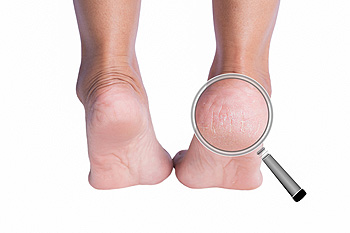



The foot condition that is known as cracked heels affects approximately 20 percent of adults throughout the country. Severely cracked heels are referred to as fissures, and may bleed and become infected. Cracked heels can happen from frequently wearing shoes that have an open back, or from standing on hard surfaces for most of the day. Having the correct knowledge of why this condition develops can be followed by implementing prevention strategies. These can include washing and drying the feet thoroughly, followed by applying a good moisturizer on them. It is helpful to avoid flip-flops when possible, and instead, it is beneficial to choose a shoe that has a cushioned heel. There may be existing medical conditions that may cause cracked heels to develop. These can include thyroid disorders, poor circulation, and elevated glucose levels. If you have cracked heels, it is suggested that you speak with a podiatrist who can offer you correct relief and treatment methods.
Cracked heels are unsightly and can cause further damage to your shoes and feet. If you have any concerns, contact our podiatrist from Dr. Powers Foot and Ankle. Our doctor can provide the care you need to keep you pain-free and on your feet.
Cracked Heels
Cracked heels appear unappealing and can make it harder for you walk around in sandals. Aside from looking unpleasant, cracked heels can also tear stockings, socks, and wear out your shoes. There are several methods to help restore a cracked heel and prevent further damage.
How Do You Get Them?
Dry skin is the number one culprit in creating cracked heels. Many athletes, walkers, joggers, and even swimmers suffer from cracked heels. Age and skin oil production play a role to getting cracked heels as well.
Promote Healing
Over the counter medicines can help, especially for those that need instant relief or who suffer from chronic dry feet.
Wear Socks – Wearing socks with medicated creams helps lock in moisture.
Moisturizers – Applying both day and night will help alleviate dryness which causes cracking.
Pumice Stones – These exfoliate and remove dead skin, which allows for smoother moisturizer application and better absorption into the skin.
Change in Diet
Eating healthy with a well-balanced diet will give the skin a fresh and radiant look. Your body responds to the kinds of food you ingest. Omega-3 fatty acids and zinc supplements can also revitalize skin tissue.
Most importantly, seek professional help if unsure how to proceed in treating cracked heels. A podiatrist will help you with any questions or information needed.
If you have any questions, please feel free to contact one of our offices located in Bloomington, Bedford, and Washington, IN . We offer the newest diagnostic and treatment technologies for all your foot care needs.